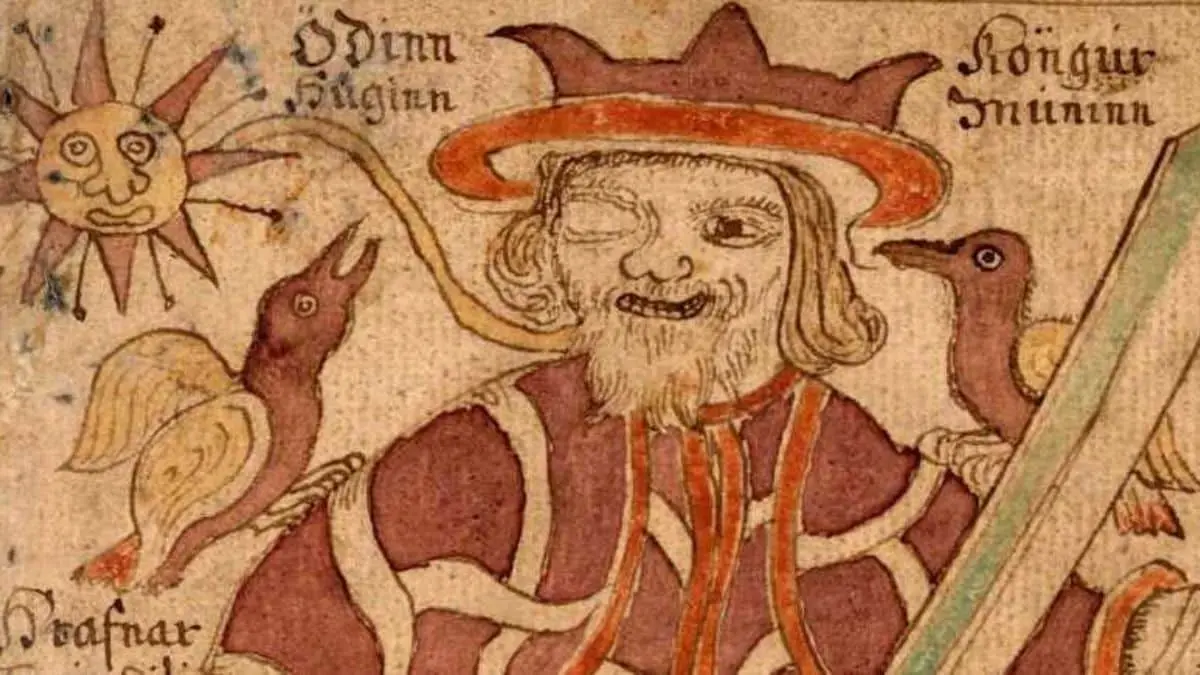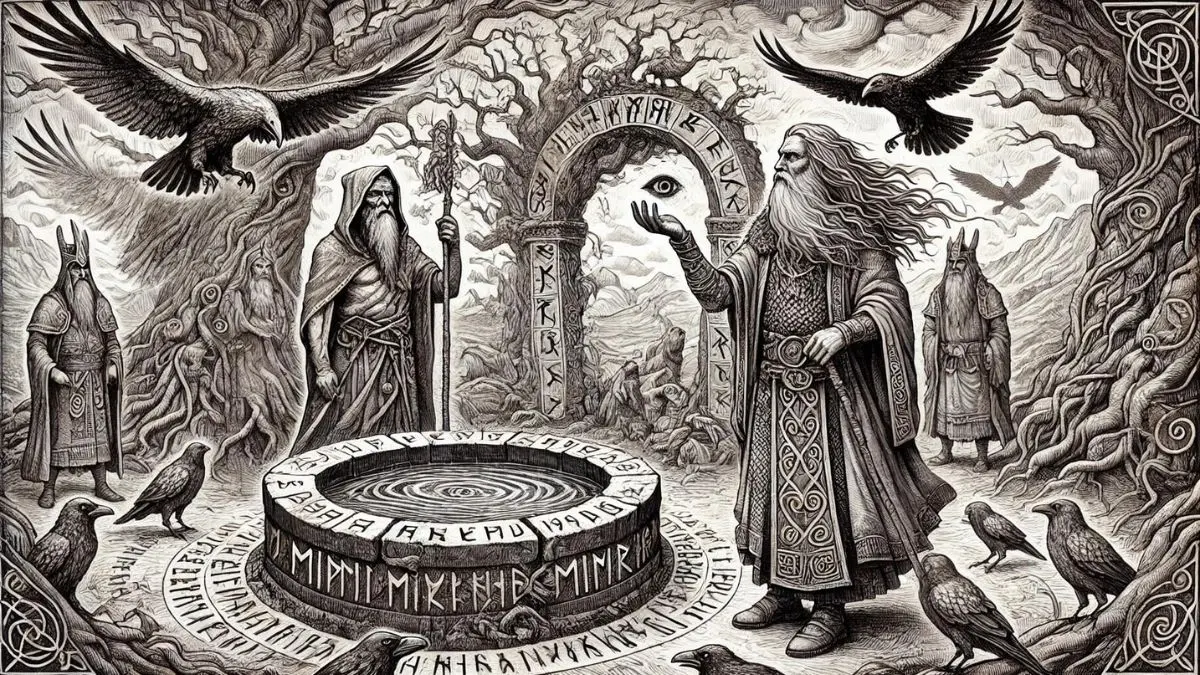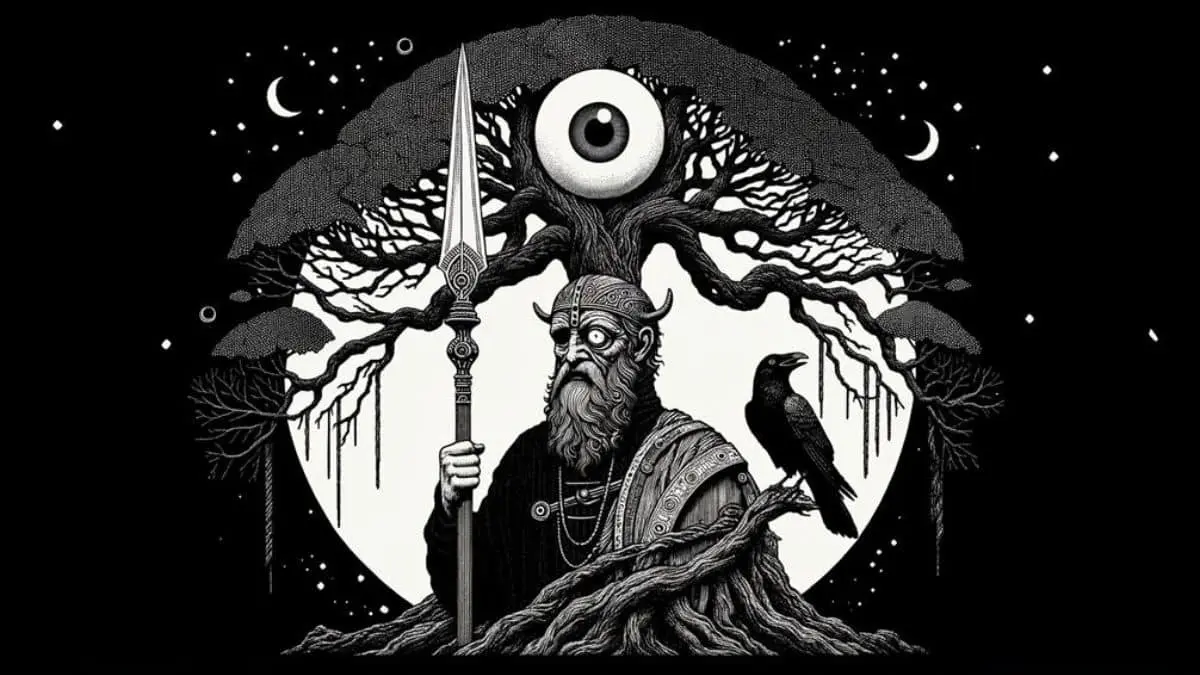Odin, the chief god of Norse mythology, is widely known for his relentless pursuit of wisdom. His sacrifice of one of his eyes is one of the most striking and profound acts in mythological lore, offering rich symbolic meaning about the value of knowledge and the lengths one might go to obtain it.
Odin’s Quest for Wisdom
In Norse mythology, Odin’s journey to Mimir’s Well—a mystical fountain of knowledge located at the roots of Yggdrasil, the World Tree—marks the beginning of his legendary sacrifice. Mimir, a giant renowned for his unmatched wisdom, was the well’s guardian. Odin’s desire to access this profound knowledge led him to ask Mimir for a drink from the well, but this was no ordinary request. Mimir, understanding the immense value of the wisdom held within the waters, demanded a steep price in return: one of Odin’s eyes. Without hesitation, Odin plucked out his eye and dropped it into the well, a symbolic gesture of his willingness to sacrifice part of his physical self for deeper, spiritual insight.
The Price of Knowledge
The act of giving up his eye symbolizes Odin’s commitment to transcending ordinary, physical understanding in favor of ethereal wisdom. By losing an eye, Odin metaphorically exchanges worldly sight for inner vision—an understanding of the cosmos that surpasses mere physical perception. This act represents a common theme in Norse tradition: the intertwining of sacrifice and wisdom. The gods often undergo painful transformations and losses to achieve enlightenment. In Odin’s case, the sacrifice of his eye also signals his readiness to accept that true wisdom often comes at a significant personal cost.

The Symbolism of the Eye
Odin’s missing eye is a powerful symbol in Norse mythology. It reflects a shift from the physical to the spiritual. The eye, often associated with sight and perception, stands for clarity and understanding in the human realm. By offering his eye, Odin shows that to gain divine or cosmic wisdom, one must be willing to relinquish attachment to the mundane. It suggests that real knowledge cannot be fully achieved through physical senses alone; instead, it requires a form of spiritual awakening and dedication.
This is why, even after making such a sacrifice, Odin’s wisdom was considered unparalleled among the gods. He gained insight into the runes, cosmic truths, and the workings of fate itself. The well’s waters didn’t just impart facts but a deep, spiritual understanding of the universe’s complexities.
Odin’s Wisdom and Its Consequences
Post-sacrifice, Odin’s newly acquired wisdom had far-reaching effects. Not only did it elevate him as the wisest god in Asgard, but it also enhanced his ability to foresee events, particularly the inevitability of Ragnarök, the prophesied destruction of the gods. This foresight allowed him to lead the Aesir gods with a sense of understanding and purpose, knowing the tragic fate that awaited them. However, despite his deep knowledge, even Odin could not prevent the inevitable.
This idea of wisdom coming with the burden of foresight is another layer of the story’s symbolism. While Odin’s eye allowed him to see beyond the immediate and into the future, it also meant that he was aware of the doom of the gods, including his own demise at Ragnarök. This serves as a lesson that knowledge, while powerful, can also bring with it the weight of understanding harsh truths.
The Deeper Meaning: Sacrifice and Transformation
Odin’s sacrifice teaches a key lesson that resonates even in modern times: that the pursuit of wisdom requires dedication, personal transformation, and often, sacrifice. This theme is universal, appearing in many cultures’ mythologies. For instance, the Greek god Prometheus, who stole fire from the gods to give it to humanity, endured great suffering for his actions. Similarly, Odin’s sacrifice of his eye underscores the idea that wisdom and enlightenment are not easily attained—they come with a price.
Odin’s act is not just about gaining knowledge but about what one must give up to achieve true understanding. The symbolism of his eye also points to a deeper concept of perspective. By losing an eye, Odin’s vision became less about the external world and more focused on the internal and the spiritual. It’s a reminder that sometimes, to see more clearly, one must be willing to give up what seems essential.

Lasting Legacy in Culture
The myth of Odin’s eye has endured for centuries and remains a compelling narrative in various forms of modern storytelling. From literature to films, the story of Odin’s sacrifice serves as a powerful metaphor for the pursuit of knowledge at any cost. It highlights the idea that wisdom is not only valuable but also transformative. Odin’s story has become a symbol of inspiration, teaching us that profound knowledge often requires looking beyond the obvious and embracing sacrifice.
In popular culture, Odin is frequently depicted as the one-eyed god, a visual cue that instantly evokes his legendary pursuit of wisdom. This imagery reinforces the timeless relevance of his story, reminding audiences of the profound lessons embedded in Norse mythology.
Also Read: The Origin and Legacy of the Minotaur in Greek Mythology









